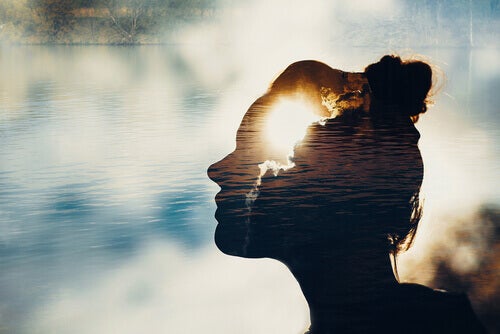(Exploring Your Mind) People are always talking about human instincts. Nevertheless, most people might not know what that means. This is a phrase that was borrowed from biology. It reminds us that, at the end of the day, humans are just mammals that evolved beyond the rest.
Related Get to Know the Psychology of Persuasion
by Staff Writer, August 6th, 2019
However, some peculiarities make people different from animals. You may have heard people talk about the human instinct of survival, for example. Despite the fact that most people believe humans have this instinct, you know that suicide is a daily occurrence in today’s world. You’ve also surely heard about sexual instincts. Yet you know that impotence and other sexual dysfunctions exist.
“Instinct is a marvelous thing. It can neither be explained nor ignored.”
-Agatha Christie-
As you can see, the topic of human instincts doesn’t just end with a biological discussion. There’s a range of cultural and symbolic vectors that influence it all. In fact, there are schools of thought that don’t discuss instincts at all. Instead, they speak of “drives”.

The biological theory of human instincts
From a biological standpoint, human instincts are blueprints for behavior that are hereditary and common across the species. The purpose of these instincts is to help people adapt to their environments. They’re pre-programmed in the brain itself. These instincts allow you to protect yourself and keep yourself alive. They manifest themselves as immediate or automatic reactions.
Buy Book Mind Control: Human Psychology, Manipulation, Persuasion and Deception Techniques Revealed
Biological theory indicates that humans have some basic instincts:
- The survival instinct. This involves all basic behavior that helps you preserve your life and health. Some examples are the avoidance of danger, eating, and the search for shelter.
- The reproductive instinct. This one involves the preservation of the species. Basically, it’s about reproductive sexuality.
- The religious instinct. Even though there’s no consensus on this point, most psychologists of the positivist school indicate that human beings have an innate need to find meaning in their lives. They claim this instinct is connected to the same area of the brain that’s active during epileptic episodes.
However, this approach doesn’t explain why, for example, a person stops eating when they feel obese even though they’re not. This would seem to go against the automatic nature of instincts.
The theory of drives
Sigmund Freud proposed that there are no instincts as such in human beings. He claimed that humans had species-specific forces he called drives. These drives are psychological impulses that are composed of a state of excitement and physical tension.
Drives seek to unload or suppress this state of tension. In order to achieve that, they seek an object that will allow them to get rid of it. For example, hunger corresponds to a drive and food is the object that allows humans to liberate themselves from that drive. We return to the initial question: Why, then, do some people not eat? Freud proposes that not all human impulses are benign.
For Freud, there were two basic drives: Eros and Thanatos. The Eros drive included all those impulses related to self-preservation and sexuality. The Thanatos drive corresponded to that of death and involved violent, chaotic, and dispersing impulses, as well as the desire to return to the inanimate state. Drives don’t actually seek to satisfy immediate needs themselves but their mental representations.

Buy Book The Kybalion [Hermetic Philosophy and Natural Law Principles]
Other theories
There are also other theories on human instincts. These attempt to establish a middle ground between the biological theory and the drive theory. Basically, these categorize drives in a different way, taking aspects of one or the other theory into account.
According to these approaches, human instincts can be divided into:
- Life instincts. These include the sexual instinct and the fight or flight impulses. They’re generally equitable to the survival instinct.
- Pleasure instincts. Their objective is to provide the highest level of well-being to the human being and they’re a refinement of the human survival instincts. For example, you don’t just drink water to survive. You may also add flavors to it.
- Social instincts. These are the needs for company, power, prestige, and property.
- Cultural instincts. The impulses to know, discover, and express yourself artistically, among others.
In casual conversation, people also talk about other instincts such as the maternal instinct. This is supposedly the reason why women always love children. There’s also the instinct of repulsion or rejection of things that you find disgusting. Which of these theories on human instincts is the right one? As of yet, there’s no definitive answer to this question.
Stillness in the Storm Editor: Why did we post this?
Psychology is the study of the nature of mind. Philosophy is the use of that mind in life. Both are critically important to gain an understanding of as they are aspects of the self. All you do and experience will pass through these gateways of being. The preceding information provides an overview of this self-knowledge, offering points to consider that people often don’t take the time to contemplate. With the choice to gain self-awareness, one can begin to see how their being works. With the wisdom of self-awareness, one has the tools to master their being and life in general, bringing order to chaos through navigating the challenges with the capacity for right action.
– Justin
Not sure how to make sense of this? Want to learn how to discern like a pro? Read this essential guide to discernment, analysis of claims, and understanding the truth in a world of deception: 4 Key Steps of Discernment – Advanced Truth-Seeking Tools.
Stillness in the Storm Editor’s note: Did you find a spelling error or grammar mistake? Send an email to [email protected], with the error and suggested correction, along with the headline and url. Do you think this article needs an update? Or do you just have some feedback? Send us an email at [email protected]. Thank you for reading.
Source:
https://exploringyourmind.com/the-abcs-of-human-instincts/

Hi Justin.
I admire that you have a very strong intekkect. I do not and so a lot of times I do not comprehend your articles.
I am more body centered . I thought that instincts come from our gut and our cells not our brain so I disagree w this article.
Shastra
Shastra, most of the content on the site I didn’t write. I ensure my name is listed when I do, at the top where it would say “by Justin Deschamps”
As for instincts, they come from various places, the soul, via the heart, the brain, via neurology, the body, via the central nervous system, and dna. The “gut” aspect is a complex interaction between neural connections in the gut and the lower brainstem.
I suggest you start digging into the psychology if you want to know. There’s a lot to get your head around and it will take time to make sense of how they talk about things, but despite some errors, there is much wisdom to gain in digesting accumulated scientific knowledge within the field of psychology.